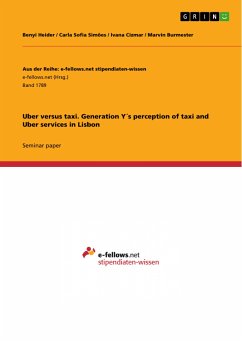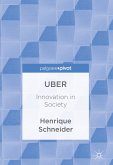Seminar paper from the year 2016 in the subject Economics - Case Scenarios, grade: 17,0 (=1,3 in Deutschland), Católica Lisbon School of Business & Economics, language: English, abstract: This report investigates the effects and influence of Uber’s market entry in the greater Lisbon area. More specifically, the study evaluates the resulting impact on “Generation Y”’s perception of traditional taxi services. Based on the findings of the research, the report suggests concrete managerial implications to the traditional taxi industry. The overall research was designed to derive insights based on both, qualitative and quantitative approaches. The qualitative research was performed with two focus groups and created the foundation for the quantitative research, which was executed using an extensive online questionnaire with 94 participants. Both approaches targeted respondents classified as “Generation Y”. Core findings include the most significant attributes to evaluate traditional taxi services. Most importantly, the price, the friendliness of the driver and security were highlighted. Moreover, the overall satisfaction of customers is further determined by attributes such as availability, comfort and payment process. It must be considered however, that taxi services are rated significantly different among Uber users and non Uber users. As the former have ranked taxi services significantly worse than non Uber users, it can be concluded that the recent market entry of Uber influences and changes “Generation Y”’s perception of traditional taxis. The complementing finding that Uber services have been evaluated significantly more positive among the all respondents impressively emphasizes the thread for traditional taxis in the greater Lisbon area. The emerging competitor Uber is perceived as superior, even among the non Uber users. Both, the qualitative and quantitative analysis revealed that the traditional taxi industry currently faces major problems related to the lack of trust, transparency and security of the services, as well as the limited options of payment methods. For the time being, this leaves the services’ availability as the only competitive advantage of the traditional taxi industry. In order to secure its competitiveness in any market scenario, it can be concluded that the industry needs to adapt its core services with regards to multiple service features. With a focus on “Generation Y”, the taxi industry must introduce tools and mechanisms to enhance and control transparency, foster the acceptance of credit cards as a payment method and ultimately drop prices to a perceived fair and competitive level.









